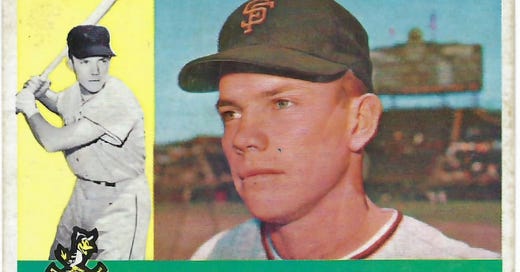The Bird Tapes Interview: Jackie Brandt
He covered a lot of ground in centerfield in the early '60s, and when I interviewed him years later, he poignantly evoked his era of baseball, when the sport was simpler and, in his opinion, more fun.
When I interviewed Jackie Brandt in 1999 for my book on Orioles history, he could have expressed frustration at some of the unfortunate timing he experienced during his career.
For instance, after manning center field at Memorial Stadium through the early ‘60s on teams that consistently contended for pennants but never won one, he was traded by the Orioles to the Philadelphia Phillies before the 1966 season — a campaign in which his former teammates dominated the American League and swept the Los Angeles Dodgers in the World Series. The Orioles then won three more pennants and another World Series over the next five years.
In other words, after putting in six quality seasons to help the Orioles establish themselves in Baltimore, Brandt just missed the glory years.
Also, as with all players from his era, Brandt just missed the emergence of major contracts and big money, which came via free agency in the ‘70s and soon accelerated to soaring thresholds no one could have envisioned when Brandt played.
“Albert Belle makes more money in one at-bat than I did in my first three years in the major leagues,” Brandt said during our conversation. (At the time, Belle was playing on the largest contract in Orioles history, a $65 million deal signed in 1998.)
But in his vintage interview with me, available below to paid subscribers, Brandt doesn’t grimly list grievances. To the contrary, he spends the hour (or so) recalling his playing days with unabashed delight.
No, he didn’t earn a World Series ring or make the big bucks, but I dare you to name a Bird Tapes interview subject who had more fun playing major league baseball.
“We had a ball,” Brandt told me.
In our conversation, he evoked a time when baseball was less corporate and more personal and casual, very much a human-scale enterprise. Brandt lived in a rented house directly behind Memorial Stadium’s center-field fence. He held meet-and-greet sessions with fans before games. As the host of a televised pregame show, he sat in the dugout and asked teammates goofy questions. On the road, he and best-buddy Boog Powell haunted country-and-western bars and partied with stars Buck Owens, Roy Clark and Hank Snow.
“We had one job — play games, sign autographs, talk to the fans and get them interested,” he said. “Nowadays, they don’t give a shit about the fans.”
Compared to all the fun he had, it just didn’t matter to him in the long run that a World Series ring eluded him and he had to work for UPS for 21 years after his retirement from baseball because he hadn't earned enough money.
“Doesn’t bother me,” Brandt said. “We had camaraderie. Eight to 10 of us would get together and have a blast (in the clubhouse) after the game. You go down there now (in the late 1990s) and the clubhouse is empty 15 minutes after the game. They’re all gone. We’d be in there until two in the morning, talking about the game and drinking beer. Me and Boog and (Luis) Aparicio and Jerry Adair, a couple of others. That was cool. Why take a shower and go home?”
When the Orioles acquired him before the 1960 season, he had just won a Gold Glove playing left field for the San Francisco Giants next to a pretty good center fielder named Mays. Orioles manager Paul Richards moved him to center because Mickey Mantle was the only player in the American League faster to first base. In 1961, Brandt hit .297, scored 93 runs and made the All-Star team.
“I could do a lot of things. I could run good, had a great arm. I was a good outfielder,” Brandt said.
He played through the era when the Orioles won a lot of games (at least 94 in three seasons in the early ‘60s) but couldn’t unseat the Yankees at the top of the American League.
“The whole time I was here, we were pretty good,” Brandt said. “But we lacked something and Frank Robinson brought it (after Brandt was gone in 1966).”
But Brandt made his mark off the field as much as on it. He felt an inherent connection to the fans.
“I would talk to them before games, get them laughing. I was colorful. I did a lot of goofy stuff,” Brandt recalled, unable to suppress a smile years later as he recalled the good times he experienced.
His tenure in Baltimore petered out as Paul Blair emerged as the Orioles’ next center fielder, prompting the club to trade him in 1966. But Brandt never left Baltimore, in one sense. Although he wound up living in Virginia, I interviewed him in 1999 at his daughter’s house in Baltimore County, with his grandchildren scrambling at his feet, vying for his attention. Life was good. Actually, it was very good.
Keep reading with a 7-day free trial
Subscribe to The Bird Tapes to keep reading this post and get 7 days of free access to the full post archives.





